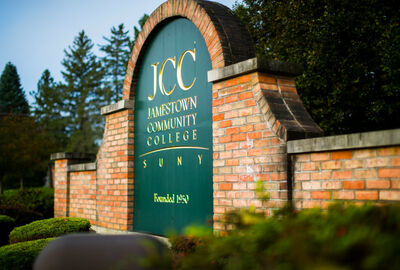Jamestown Community College, the first locally sponsored community college chartered by the State University of New York system, is celebrating its 70th anniversary this year. As part of that celebration, JCC has created profiles of some of its more than 28,000 alumni.
A ‘Smaller’ More ‘Personal’ Experience
With smaller class sizes, professors knew Greg Bohall’s name at JCC. The Jamestown native didn’t feel like just a number.
Bohall remembers his time in Jamestown fondly and initially utters one word when thinking back: “smaller.”
A smaller campus, a reduced population, and condensed classrooms are all at the center of the city of Jamestown — Bohall’s home.
Around 2000, Bohall, now a clinical and forensic consultant, was still trying to figure it out on JCC’s Jamestown Campus, which was without residence halls at the time. Twenty years later, and half as much time in secondary learning, he praises the atmosphere of where he started.
“I liked going to JCC for the first two years,” says Bohall, who graduated from Jamestown High School in 2000 and from JCC in 2002. “It was personable. My teachers knew me. I knew them. I could reach them.”
After JCC, Bohall received a BA in psychology from Seton Hill University in 2004; an MS in rehabilitation counseling from the University of Buffalo; and a PsyD in clinical forensic psychology from the Chicago School of Professional Psychology in Los Angeles. Based on his college resume alone, Bohall has seen the full gamut of the college experience. He’s even lectured to large classes in massive lecture halls. But for him, while at these larger institutions, he says, “there was nothing personal about it.”
Comparing a community college to a larger university, he says, “So you’re sitting in a lecture hall with 300 students and out here (in Los Angeles) there’s USC and UCLA, and I’ve seen those classrooms. I’ve lectured those classrooms and in those rooms, you don’t know the students’ names, you just know them as the last four of their social.”
But at JCC there was a personal touch that resonated with him.
“If I had questions [faculty] were always good about it and I felt that it was rigorous enough that it was challenging, so I had nothing but a positive experience there,” Bohall recalls. “I can’t think of a negative experience in terms of teaching or location or anything really.”
Looking back, he remembers several professors who had a lasting impact. Though carving out a career in psychology, Bohall references a former sociology professor, John Hearn. The casualness, yet professional, aspect to his classes stuck with him.
“He was casual but good,” Bohall remembers. “He knew his stuff and was serious when he needed to be serious.”
The overall experience of JCC is still with him and is not forgotten when offering advice to prospective college students. When speaking with younger people, through teaching opportunities or consultations, Bohall reminds them of the significance of a community college.
“I always recommend going to a community college because you’re getting, basically, the same education but with smaller classrooms,” he says.
After graduating from UB, Bohall remained in Buffalo to work in drug treatment courts, a precursor to his current work in forensic psychology.
“You get what you put in,” Bohall says of the treatment services while comparing it to college.
“I love drug treatment courts. They hold the client accountable while also being therapeutic,” he says.
Now, living near Los Angeles, Bohall says his day-to-day routine changes frequently, something he enjoys. He can be found in hospitals, correctional and community facilities, or providing teleservices all in one day. The next day could be completely different for him.
“It changes all the time,” he says.
In his work throughout Los Angeles, Bohall often provides parole and probation consultations, attorney consultations, organizational training, quality assurance services, and program and grant writing services. He’s currently under contract with Springer Publishing Company for a series of textbooks titled Dangerous Behaviors in Clinical and Forensic Psychology related to psychology and focusing on psychopathy, sex offenders, intimate partner violence, affective violence, predatory violence, suicidality and self-injury, terrorism, workplace harassment, and school bullying.
Soon, Bohall and his wife, Mary-Jo Bautista-Bohall, will have their own private practice company called Innovative Psychological Solutions, Inc. While Bohall will focus on his specialty, forensic psychology, his wife will continue her work in general clinical psychology.
“It will be a full-blown private practice,” Bohall says.
Though JCC was only a quarter of his collegiate career 20 years ago, Bohall believes staying local in Jamestown was ideal for him. He questions how well he would’ve performed in college if he had jumped straight into a four-year institution, even joking that he may have flunked a course or two. At JCC, though he never failed a class, he says he felt comfortable knowing that he could “bounce back” if need be.
A good portion of Bohall’s life was spent in the classroom, and he credits JCC to showing him the ropes of the college atmosphere and what is expected from a college student.
“When I went away for my four-year (degree), I had an idea how to be a student,” he says.
Bohall was 18 when he enrolled at JCC and was 20 when he started at Seton Hill. He relishes the fact that he had two years of a “transition.”
He adds, “A lot of development occurs at that point and I think you can really benefit from that outside of the education. I think that’s a benefit.”

